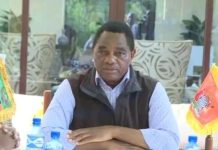Africa-Press – Zambia. 1. Over the past 58 years of our independence, the issue of economic empowerment for our citizens has been on the lips of each of the seven presidents that Zambia has had so far. However, it has hardly materialized. The Zambian people remain economic orphans in their own country. Up to this day, the concept of a successful Zambian is one with a big job position, lives in mayadi, drives a big car and buries their relatives at memorial park. In other words, we are literally economic spectators. The wealth of Zambia is in the hands of foreigners. Different industries are dominated by different groups of foreigners; South Africans, Chinese, Indians, Lebanese, etcetera dominate and run our economy. The only industry dominated by Zambians is street vending!!
2. This is in total contrast to our neighboring countries. The Tanzanian economy for instance is in the hands of Tanzanians. The only dollar billionaire in the country; Mohammed Dewji is an indigenous Tanzanian. Similarly, for all countries in the region, their wealth is in the hands of the indigenous people. Arguably the richest family in Botswana; the Magang family is indigenous. In South Africa, despite a history of apartheid, the wealth still circulates among the citizens of that country; white, Indian, black and colored. Even in Zimbabwe here, Strive Masiyiwa is an indigenous citizen and dollar billionaire. Additionally, the economy is in the hands of the Zimbabwean people. Between individual citizens and the Zimbabwean Government, they run more than 80 percent of all the mines, including diamond and gold mines.
3. Here in Zambia we boast of democracy and yet we have nothing to show for it economically. We are destitutes in our own country. Our so-called big businessmen in the country depend on foreigners to give them a contract in the mines or a sub-contract for construction. Instead of it being the other way round, whereby foreigners depend on Zambians to give them a sub-contract. Our most educated citizens depend on foreign multi-national corporations to be given a job as MD or CEO, and when that happens, we are over-the-moon celebrating that as success. Our idea of success has been reduced to trifles. We have a poverty mentality.
4. If we are going to successfully empower our citizens and allow them to take full charge of the economy in the next few decades, we need a paradigm shift in the way we think and do things. Our citizens need to be inculcated with an entrepreneurial mindset from the word go. Not everyone can be employed, but everyone can start a business. In fact, almost each and every Zambian has tried to run one business or the other in their lifetime. The majority have failed completely, a few have stagnated, and even fewer have succeeded. Of course there are various obstacles to running a business, but perhaps the biggest is lack of capital. The salaries in the economy are generally nominal and for most people, it is hand to mouth. This means that there are no savings to talk about. Most financial institutions are only willing to give salary-backed loans. If one has no job and no salary, the chances of getting a loan are almost nil. For starters, financial institutions will ask for onerous KYC requirements, as if you are applying to join the CIA as a spy.
5. Yet, as a nation, we have huge economic potential in almost all sectors of the economy. What then should be done to truly economically empower our citizens, regardless of their education level or employment status? Some people think that when they invite a few Zambians to attend an EU-Zambia Business Forum, then they have empowered the citizens! No. That is simplistic thinking. What empowerment can one really derive from long speeches by a few elite individuals? What about that Zambian from Marapodi, or Kalikiliki or Misisi compound who does not even have transport money to jump on a bus to come and attend your EU-Zambia Business Forum at Mulungushi. How do you intend to empower him or her?
6. Personally l have never believed in charity. I see charity as a bottomless pit and a catalyst for greater poverty. I believe that everyone must carry their own weight. That apart from children and the elderly, everyone else must work for their livelihood. However, l also strongly believe that every citizen deserves a fair chance to succeed in life. Just a fair chance. If they decide to waste that chance, then it’s their fault. But everyone deserves a fair chance, regardless or their education level or social status. So the question then becomes; how can the Government facilitate that each and every citizen is given a fair chance to succeed in life. People talk about Government creating opportunities for citizens to exploit. That is well and good. But opportunities generally favor those who are already empowered. But what about those citizens who are at zero? No education, no money, no food, no hope. How can every citizen be economically empowered including the vulnerable in our society?
7. I strongly believe that the State must give a small share of the national wealth to each and every adult citizen as an interest free loan, at one point or the other. Of course the finer details can be polished along the way, but here is what l have in mind: there are about 18 million Zambians in the country at the moment, of which about 10 million are above the age of 21. Each citizen can be extended an interest free loan of say K50,000 to be repaid within 12 months. That would cost the treasury approximately K50 billion. The 2022 national budget was K173 billion. So this citizen empowerment expenditure would have constituted only 28.9 percent of the 2022 national budget. The qualifying criteria would be just a valid NRC and perhaps confirmation of residence by the Ward Development Committee. Even if the 10 million eligible citizens are not funded in one fiscal year, that would still be fine.
8. Of course those who are already well-to-do will decline the K50,000 interest-free loan, since it would be pocket change to them. But it would make a huge difference in the lives of most citizens, including farmers. Of course with such a loan facility available to every citizen, other social assistance programs such as Farmer Input Support Programme (FISP) and Social Cash Transfer (SCT) would have to be cancelled. Peasant farmers would have to buy their farming inputs using the K50,000 loan. The elderly can invest the K50,000 in treasury bills or other investments and get a return of about 15 to 20 percent per annum. That would amount to about K10,000 or about K800 per month, which is far much better than the K150 per month which Government currently pays under SCT.
9. Naturally, there would be some huge defaults in paying back this K50,000 interest free loan per citizen, and that’s why the treasury should budget this as an expenditure so that if people pay back, it would be a bonus for the treasury. However, there are some measures that can be put in place to improve the recoverability of these loans. For instance, citizens can be told that those who repay the K50,000 loan will qualify for K100,000 a year later. This would be a big incentive. Additionally, for those who default, Government can recover it directly from their bank accounts in collaboration with financial institutions, or from their mobile money accounts in collaboration with MNOs. Ultimately, if properly managed and devoid of corruption, the bad debts would be less than 20 percent, largely from those who might have met their demise.
10. There are various benefits that would arise from such an interest-free loan programme. Firstly, it would spur demand in the economy because people would have purchasing power. Therefore, it would drive economic growth. The risk of demand-pull inflation would be low because this capital injection would largely be in the informal sector. Most of the inflation in the informal sector is cost-push and not demand pull. For instance, Bana Mwape in Chamboli will not increase the price of her fritters simply because of high demand such that everything that she made was sold within one hour, she’ll just make more. The only thing that will compel Bana Mwape to increase prices is if the cost of cooking oil or flour or transport to town has gone up (cost-push inflation). The other key benefit that would arise from such a program is that Government would have an opportunity to wean off its dependents under FISP and SCT, as they would now be self-sustainable. But most importantly, every citizen would have been given a fair chance to make something out of their life. Those who waste the opportunity and revert back to abject poverty can no longer blame their fate on losing parents at a young age, or not being able to go to school, or being born in the remote part of the country or on lack of empowerment from the Government or any of the other excuses people generally give for their adverse economic circumstances. The poor would have only one thing to blame: their laziness. This would be true economic empowerment, not the simplistic notion of inviting citizens to attend an EU-Zambia Business Forum at Mulungushi.
For More News And Analysis About Zambia Follow Africa-Press







